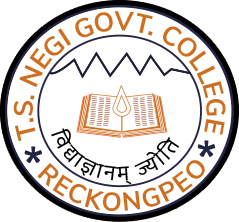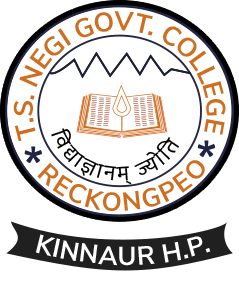CBCS
The CBCS provides an opportunity for students to choose courses from the prescribed courses comprising core, elective or skill based courses. The courses can be evaluated following the grading system. The UGC has introduced uniform grading system in entire higher education in India, the cumulative grade point average(CGPA) based on students performance in examination, UGC has formulated the guidelines to be followed
- Compulsory Course: A course, which should compulsorily be studied by a candidate as a core requirement is termed as a Compulsory Course such as Eng/Hindi/Sanskrit(one either of two)
- DSC: Discipline Specific Core, is the core course which a candidate has to study throughout the degree course in Humanities/Science/Commerce.
- Discipline Specific Elective (DSE) Elective courses may be offered by the main discipline/subject of study is referred to as Discipline Specific Elective (to be offered by main discipline/subject of study) and and may be considered very specific or specialized or advanced or supportive to the discipline/ subject of study or which provides an extended scope or which enables an exposure to some other discipline/subject/domain or nurtures the candidate’s proficiency/skill
- Ability Enhancement Courses: The Ability Enhancement (AE) Courses may be of two kinds: Ability Enhancement Compulsory Course (AECC) and Skill Enhancement Courses (SEC). AECC courses (two) are the courses based upon the content that leads to knowledge enhancement. They are [ ( i) Environmental Science, (ii) English & Hindi/Sanskrit Language] are mandatory for all disciplines.
SEC courses (minimum two) are value-based and/or skill-based and are aimed at providing hands-on-training, competencies, skills, etc.
- An Undergraduate degree in Humanities/ Social Sciences/ Commerce may be awarded if a student completes 4 core papers each in two disciplines of choice (DSC), 2 core papers each in English and Hindi/Sanskrit (CC), respectively, 2 Ability Enhancement Compulsory Courses (AECC), minimum 4 Skill Enhancement Courses (SEC), 2 papers each from a list of Discipline Specific Elective (DSE)papers based on the two disciplines of choice selected above, respectively, and two papers from the list of Generic Electives (GE) papers.
- An undergraduate degree in Science disciplines may be awarded if a student completes 4 core papers each in three disciplines of choice, 2Ability Enhancement Compulsory Courses (AECC), minimum 4Skill Enhancement Courses (SEC)and 2 papers each from a list of Discipline Specific Elective papers based on three disciplines of choice selected above, respectively.
- A/ B.Sc with a particular subject would require a student to study Skill Enhancement Course of that subject (SEC’s) in third year.
- From the current session of 2018-19 Semester System in Under Graduate classes has been changed to Annual System; however the semester system shall continue for students admitted in Session 2017-18. Pass Course Credit for B.A/B. Sc/B.Com will be 132 Credits; Honour Course Credit for B.A/ B. Sc/ B.Com will be 148 Credits. The B.A student has to choose two Discipline Specific Courses (DSC) out of the subject combinations available and the B.Sc Students have to choose three (DSC) out of the subject combinations available. Compartment case is allowed if a candidate is unable to pass in two subjects. The Pass Percentage is 40% in each subject including internal assessment.
Humanities
Three subject pools have been formulated for humanities stream in which a student can choose a DSC I from subject pool A,B or C and DSC II from other two subject pools but two DSC’s cannot be chosen from a single subject pool with an exception of Sociology where a student can choose Hindi / Sanskrit as DSC II from same subject pool.
| Pool A | Pool B | Pool C |
| Education | Mathematics | English |
| Economics | Political Science | Hindi |
| Music | Public Administration | Sanskrit |
| Physical Education | Psychology | Geography |
| History | Computer Science | Sociology (can choose DSC II as Hindi/ Sanskrit) |
| Journalism and Mass Communication | Philosophy |
Credit distribution for the subjects in B.A& B.Com Annual System
| YEAR | Discipline Specific Core (DSC) |
Ability Enhancement Compulsory Course (AECC) |
Discipline Specific Elective (DSE) |
Skill Enhancement Course (SEC) |
Generic Elective (GE) |
CREDITS |
|---|---|---|---|---|---|---|
| I | ENG =6 Hindi/Skt =6 DSC-1A=6 DSC-1B=6 DSC-2A=6 DSC-2B=6 36 credits |
Env. Science=4 Hindi/Skt/ Eng=4 (one of three) 8 credits |
Nil | Nil | – | 44 |
| II | ENG =6 Hindi/Skt = 6 DSC-1C=1X6 DSC-1D=1X6 DSC-2C=1X6 DSC-2D=1X6 36 Credits |
Nil | – | SEC-1=4 SEC-2=4 8 Credits |
– | 44 |
| III | Nil | Nil | DSE1A=6 DSE 1B=6 DSE 2A=6 DSE 2B=6 24 Credits |
SEC-3=4 SEC-4=48 Cr |
GE1=6 GE2=612Credits |
44 |
| Total Creadits |
72 | 08 | 24 | 16 | 12 | 132 |
Science
| Botany | Chemistry Zoology |
| Chemistry | Zoology, Botany (Med.) Physics, Maths (Non Med.) |
| Physics | Chemistry Maths |
| Mathematics | Chemistry Physics |
| Zoology | Chemistry Botany |
Ability Enhancement Compulsory Course (AECC): Two papers of 4 credit each in which Environmental Science (4 credits) needs to be qualified in First Year itself
Credit distribution for the subjects in B.Sc Annual System
| YEAR | Discipline Specific Core(DSC) |
Ability Enhancement Compulsory Course (AECC) |
Discipline Specific Elective (DSE) |
Skill Enhancement Course (SEC) |
CREDITS |
|---|---|---|---|---|---|
| I | DSC-1A=6 DSC-1B=6 DSC-2A=6 DSC-2B=6 DSC-3A=6 DSC-3B=6 36 credits |
Env. Science=4 Hindi/Skt/ Eng=4 (one of three) 8 credits |
Nil | Nil | 44 |
| II | DSC-1C=6 DSC-1D=6 DSC-2C=6 DSC-2D=6 DSC-3C=6 DSC-3D=6 36 Credits |
Nil | – | SEC-1=4 SEC-2=4 8 Credits |
44 |
| III | Nil | Nil | DSE1A=6 DSE 1B=6 DSE 2A=6 DSE 2B=6 DSE 3A=6 DSE 3B=6 24 Credits |
SEC-3=4 SEC-4=48 Credits |
44 |
| Total Creadits |
72 | 08 | 36 | 16 | 132 |
B.Sc.(Non-Medical/Medical)
| 1. | B.Sc.(Physics) | Compulsory(1.Mathematics 2. Chemistry) |
| 2. | B.Sc.(Chemistry) | Compulsory(1. Botany/Mathematics2. Zoology/Physics) |
| 3. | B.Sc.(Botany) | Compulsory(1. Zoology 2. Chemistry) |
| 4. | B.Sc.(Zoology) | Compulsory(1. Botany 2. Chemistry) |
| 5. | B.Sc.(Mathematics) | Compulsory(1. Physics 2. Chemistry) |
| 6. | B.Sc.(Computer Science) | Compulsory(1. Physics 2. Mathematics) |



